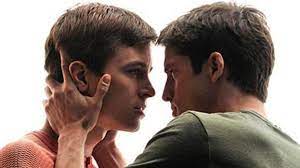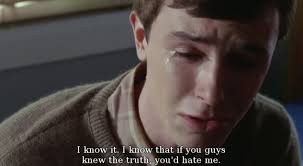🎬 Prayers for Bobby (2009)
- thaiduong
- January 14, 2025

Prayers for Bobby (2009) Review: A Powerful Story of Love, Loss, and Redemption
Directed by Russell Mulcahy and based on the true story chronicled in Leroy Aarons’ book of the same name, Prayers for Bobby is an emotionally charged drama that explores themes of faith, acceptance, and the tragic consequences of intolerance. Anchored by a stunning performance from Sigourney Weaver, the film is both a poignant family drama and a call to action for understanding and compassion within communities grappling with LGBTQ+ issues.
Plot Overview: A Mother’s Journey to Understanding
The film tells the heartbreaking true story of Mary Griffith (Sigourney Weaver), a devout Christian mother, and her son Bobby Griffith (Ryan Kelley), a sensitive and kind-hearted young man who struggles to reconcile his sexuality with his family’s conservative beliefs.
When Bobby comes out as gay, Mary’s unwavering adherence to her religious convictions leads her to reject her son’s identity, encouraging him to seek “healing” through prayer and counseling. Bobby, unable to reconcile his family’s rejection with his own self-worth, spirals into depression, ultimately leading to his tragic death by suicide.
The aftermath of Bobby’s death sends Mary on a transformative journey of self-reflection, as she questions her faith and confronts the harm her beliefs caused. Through her journey, she becomes a passionate advocate for LGBTQ+ rights, dedicating her life to promoting love and acceptance.
Sigourney Weaver as Mary Griffith: A Commanding and Heartfelt Performance
Sigourney Weaver delivers a deeply affecting performance as Mary Griffith, capturing the complexity of a woman whose love for her son is clouded by her rigid beliefs. Weaver’s portrayal evolves from a stoic, faith-driven mother to a grieving parent who confronts the consequences of her actions with raw vulnerability. Her ability to navigate Mary’s emotional arc—from denial and grief to redemption and advocacy—makes the character’s journey both relatable and profoundly moving.
Ryan Kelley as Bobby Griffith: A Heartbreaking and Authentic Portrayal
Ryan Kelley brings sensitivity and authenticity to his role as Bobby, portraying him as a compassionate and conflicted young man yearning for acceptance. Kelley’s performance captures the quiet pain of Bobby’s struggles, making his story deeply impactful. His interactions with Weaver are filled with emotional tension, highlighting the heartbreaking disconnect between mother and son.
Supporting Cast: A Strong Ensemble
- Henry Czerny as Robert Griffith: Czerny delivers a restrained performance as Bobby’s father, whose quiet demeanor contrasts with Mary’s fervor but still reflects the family’s struggles to support Bobby.
- Austin Nichols as Ed Griffith: Nichols portrays Bobby’s older brother, who embodies the complexities of sibling relationships in the face of family conflict.
- Carly Schroeder as Joy Griffith: Schroeder provides a voice of compassion and understanding, serving as a counterbalance to Mary’s initial rejection of Bobby’s identity.
Themes: Faith, Acceptance, and Advocacy
- Faith and Intolerance: The film examines how rigid religious beliefs can perpetuate intolerance, showing the devastating effects they can have on LGBTQ+ individuals and their families.
- The Journey to Acceptance: Mary’s transformation highlights the importance of self-reflection and growth, illustrating how understanding can lead to healing.
- The Power of Advocacy: The story underscores the necessity of allyship and advocacy, showing how personal loss can inspire meaningful change.

Direction and Cinematography: A Subtle and Emotional Approach
Russell Mulcahy’s direction focuses on the emotional core of the story, allowing the characters and their relationships to take center stage. The film’s visual style is understated, with warm, natural lighting that contrasts the darkness of Bobby’s struggles. The use of flashbacks and journal entries adds depth to Bobby’s character, providing a glimpse into his inner world and amplifying the emotional weight of the story.
Key Moments That Define Prayers for Bobby
- Bobby’s Confession: The scene where Bobby comes out to his family is a pivotal moment that captures the tension and heartbreak of rejection.
- Mary’s Realization: A powerful turning point where Mary reads Bobby’s journal and begins to confront the harm caused by her beliefs.
- The Advocacy Speech: Mary’s public speech at an LGBTQ+ rally is a cathartic and inspiring moment that solidifies her transformation and commitment to change.
Strengths of Prayers for Bobby
- Emotional Depth: The film tackles complex and sensitive issues with honesty and compassion, making it both heart-wrenching and inspiring.
- Sigourney Weaver’s Performance: Weaver’s portrayal of Mary is the emotional anchor of the film, delivering a performance that is both nuanced and unforgettable.
- Timely and Relevant Themes: The film’s exploration of LGBTQ+ acceptance and the harmful impact of conversion practices remains deeply relevant.
- Authenticity: By staying true to the real-life story, the film honors Bobby’s memory while shedding light on broader societal issues.
Weaknesses of Prayers for Bobby
- Predictable Structure: While emotionally impactful, the film follows a familiar trajectory that may feel formulaic to some viewers.
- Limited Perspective: The story is primarily told through Mary’s lens, leaving less room to explore Bobby’s experience in greater depth.
- Underdeveloped Secondary Characters: While the focus on Mary and Bobby is effective, other family members and supporting characters could have been more fleshed out.

Legacy and Reception
Prayers for Bobby received critical acclaim for its sensitive handling of LGBTQ+ issues and its powerful performances, particularly Sigourney Weaver’s, who earned nominations for both an Emmy and a Golden Globe. The film has become a touchstone for discussions around religion, acceptance, and LGBTQ+ rights, inspiring viewers to reflect on their own beliefs and advocate for greater understanding.
Fun Facts About Prayers for Bobby
- Based on a True Story: The film is adapted from the book by Leroy Aarons, which chronicles the real-life experiences of Mary Griffith and her family.
- Sigourney Weaver’s Commitment: Weaver took on the role with a deep sense of responsibility, working closely with LGBTQ+ advocates to authentically portray Mary’s transformation.
- Educational Impact: The film has been widely used as a tool for promoting LGBTQ+ awareness and fostering conversations about acceptance in schools, churches, and communities.
Conclusion: A Heartbreaking and Inspirational Film
Prayers for Bobby (2009) is a powerful and deeply moving drama that sheds light on the importance of acceptance, love, and advocacy. With its heartfelt performances and poignant storytelling, the film serves as both a tribute to Bobby Griffith’s life and a call to action for greater understanding and compassion. Sigourney Weaver’s transformative performance anchors the film, making it an essential watch for anyone seeking a deeper understanding of the intersection of faith, family, and LGBTQ+ rights.











